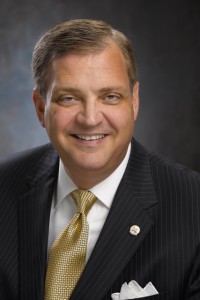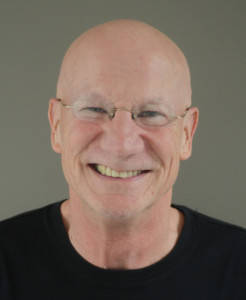One of the Southern Baptist Convention’s most influential leaders says Southern Baptist power brokers are no better equipped to handle allegations of clergy sexual abuse internally than were Catholic bishops in the 1990s.
Albert Mohler, president of Southern Baptist Theological Seminary, said he used to think child abuse and cover-ups were only a Roman Catholic problem, but recent troubling reports emerging in his own flock prove him wrong.

Albert Mohler
“A church, denomination or Christian ministry must look outside of itself when confronted with a pattern of mishandling such responsibilities, or merely of being charged with such a pattern.” Mohler said last week in a widely circulated essay. “We cannot vindicate ourselves.”
Mohler said he has given that advice consistently for years, but from now on it will be “a matter of public commitment.”
“I believe that any public accusation concerning such a pattern requires an independent, third-party investigation,” he said. “In making this judgment, I make public what I want to be held to do should, God forbid, such a responsibility arise.”
Mohler sounded a different note in 2013. That year a class action lawsuit in Maryland accused his friend, leader of a charismatic/Calvinist church planting network called Sovereign Grace Ministries, of overseeing a system to handle abuse allegations internally which discouraged victims’ families from going to the police.
Mohler and the other two T4G partners, Southern Baptist pastor and 9Marks ministries founder Mark Dever and Presbyterian educator Ligon Duncan, released a statement sticking up for a friend facing the spotlight of scandal.
“We have stood beside our friend, C. J. Mahaney, and we can speak to his personal integrity,” the trio said in a written statement. “We can make no judgment as to the truthfulness of the horrifying charges of sexual abuse made against some individuals who have been connected, in some way, to Sovereign Grace Ministries and its churches.”
The lawsuit was dismissed due to statute of limitations, but there were criminal convictions. Grant Layman, a close aide to Mahaney, admitted under oath that he failed to report abuse in the 1980s by Nathaniel Morales, a former youth group leader at Covenant Life Church in Gaithersburg, Md., to police. A Montgomery County, Md., judge called Morales a “cowardly pervert” and sentenced him to 40 years in prison in August 2014.
Mahaney, now senior pastor of Sovereign Grace Church of Louisville, Ky., planned to speak at this year’s T4G meeting, but he withdrew after Rachael Denhollander — star witness in the sentencing of former USA Gymnastics team doctor Larry Nassar — called for a “a transparent, public, independent investigation” into the Sovereign Grace Ministries scandal.
“Penn State University is a byword for sexual assault scandals, yet it took Penn State a mere six days to commission a truly independent investigation into the circumstances surrounding Jerry Sandusky,” Denhollander said March 1 on Facebook. “It took Michigan State University an excruciating 17 months to finally request a similar investigation into the Larry Nassar case.”
“Yet, it has been more than seven years and Sovereign Grace has steadfastly refused this sort of accountability in the face of multiple instances of abuse within the organization,” she continued, “even though they have been asked multiple times to clear the air.”
‘Put up or shut up,’ survivor advocate says
Christa Brown, a former Baptist who has written extensively on clergy sex abuse, church cover-ups, and clergy accountability systems in the denomination, said if Mohler is sincere, he should call for an independent third-party investigation into how patterns of sex abuse get handled in the Southern Baptist Convention.

Christa Brown
Brown has advocated for such a process for a dozen years. In 2006, she joined leaders of the Survivors Network of those Abused by Priests to hand-deliver a letter to SBC leaders challenging the party line that the denomination is powerless to weed out predatory preachers due to autonomy of the local church to select its own leaders.
SNAP — formed in 1989 early in the Catholic pedophile priest cover-up and featured in the 2015 movie Spotlight — suggested an independent review board to evaluate and inform churches about incidents of clergy abuse.
SNAP activists said if Southern Baptist churches can find ways to cooperate in endeavors such as international missions, theological education and managing retirement accounts without threatening church polity, they should be able to unite similarly against Baptist predators.
A subgroup of the SBC Executive Committee discussed the idea in a not-for-direct-quotation or attribution meeting in September 2017. Officials did not tell her it was on the agenda, but when Brown showed up, they allowed her to stay.
Much discussion centered on a letter that got lost in the mail, but work group members took offense at her suggestion they were not treating her cause as a high priority.
“We have a deep concern for the welfare of children,” SBC President Frank Page said after the meeting. “We are hurt when any other impression is given.”
What Brown remembered was a committee member saying that she lacked integrity.
“Why was there not one other person in that all-white, all-male room who would even call his colleague on the carpet for such harsh language directed at a Baptist clergy abuse survivor?” she wondered at the time.
Brown, an abuse survivor, said the same “kick the messenger” pattern is common in local churches and is a major reason that victims do not report abuse.
Brown, author of This Little Light: Beyond a Baptist Preacher Predator and His Gang, claims her Southern Baptist youth minister raped her when she was a teenager. Church leaders told her not to talk about it, and she obeyed their command until her own daughter turned the age she was at the time of abuse.
Believing parents in other churches would want to know, she contacted 18 Baptist leaders in four states asking if the man was still active in ministry. They all voiced sympathy but said there was nothing they could do. She set out looking herself and after going to the media got him fired from a church in Florida.
Along the way, she learned her alleged abuser had worked in high profile churches including First Baptist Church in Atlanta, during the time when Pastor Charles Stanley was president of the Southern Baptist Convention.
When Brown and other SNAP members sought to hand out leaflets informing church members that a former staff member had been accused of sexually abusing a minor at a previous church, First Baptist leaders ordered them to leave.
Brown said last week an independent review board and archive of abuse reports “are still much needed if this denomination wants to get real” about, as Mohler put it, “dealing rightly with questions of sexual abuse.”
“Will he issue such a call, or is his talk nothing more than that?” she wondered.
Déjà vu all over again
Two reform-minded pastors who in 2006 campaigned for South Carolina pastor Frank Page’s election as SBC president on a then relatively new communication platform — the blog — found SNAP’s idea of a denominational clearing house of information about potentially dangerous individuals worth exploring.

Wade Burleson
Wade Burleson, pastor of Emmanuel Baptist Church in Enid, Okla., was an International Mission Board trustee well known at the time for blogging about his disagreement with narrowing theological parameters within the denomination.
Attempts to silence Burleson inspired other bloggers to challenge the status quo. One of the brightest was a Texas pastor named Ben Cole, a young scholar who had lost faith in the hardball politics of his one-time mentor, Southwestern Baptist Theological Seminary President Paige Patterson.
Burleson made a motion at the 2007 SBC annual meeting in San Antonio, Texas, calling for a feasibility study about developing a database of Southern Baptist ministers who had confessed, convicted or credibly accused of sexual harassment and abuse. Cole, who later moved on to Washington politics, proposed a resolution condemning sexual abuse by clergy.
“Southern Baptists must be proactive when it comes to protecting children under our ministerial care,” Cole said in a press release.
“There is no credible reason why Southern Baptist churches cannot look to our convention headquarters for assistance in scrutinizing candidates for ministry positions,” added Burleson, a past president of the Baptist General Convention of Oklahoma. “What was once believed to consist of a few isolated cases has emerged as a more serious threat to our convention’s ministries and our churches’ health.”
That year the Southern Baptist Convention adopted a resolution expressing “moral outrage” in renouncing both sexual predators and “individuals, churches, or other religious bodies that cover up, ignore, or otherwise contribute to or condone the abuse of children.”
Parliamentary rules required referral of Burleson’s motion to the SBC Executive Committee, the governing body tasked with presenting and administering the convention’s budget. SNAP suggested consulting third-party experts, but the body opted for an internal probe. After study by staff, the Executive Committee decided not to recommend his idea to SBC messengers in 2008, calling it unfeasible.
Burleson continues to blog. He currently is investigating allegations that Southwestern Baptist Theological Seminary Emeritus Paige Patterson has a history of covering up rape.
Patterson was a mastermind of a theological/political movement starting in the late 1970s credited with bringing the current crop of SBC leaders to power. Despite starting out on the opposite side of the “conservative resurgence,” Mohler appears now to be its biggest kingmaker.
Southeastern Baptist Theological Seminary President Daniel Akin, Russell Moore of the SBC Ethics and Religious Liberty Commission, North American Mission Board President Kevin Ezell and David Platt, who recently announced he is stepping down as president of the International Mission Board to return to the pastorate, all used him as reference.
Jason Allen, president of Midwestern Baptist Theological Seminary, is a two-time graduate of Southern Seminary and served six years on Mohler’s staff before his election in 2013. “I would not be in the room today if it were not for Al Mohler,” Allen said in a panel discussion in 2015. “None of us would be in the room today if it were not for Paige Patterson.”
That was then. This is now.
Mohler’s May 23 article referred to Patterson’s downfall as Southwestern Seminary president for degrading comments about women as the Southern Baptist Convention’s #MeToo Movement.
“Judgment has now come to the house of the Southern Baptist Convention,” he prophesied. “The terrible swift sword of public humiliation has come with a vengeance.”
Brent Detwiler, one of four founders of Mahaney’s Sovereign Grace Ministries, said that is “due in large measure to Al Mohler for his unwavering support of C.J. Mahaney despite grave allegations of wrongdoing.”

C.J. Mahaney
“No one outside SGC has defended C.J. Mahaney more than Al Mohler, Mark Dever and Ligon Duncan,” Detwiler blogged May 28. “They have defended him against all charges of a conspiracy to cover up the sexual abuse of children and also defended him against all charges concerning his character and leadership in general.”
Detwiler sent Mohler and 76 other evangelical leaders an open letter in 2013 asking them to stop inviting Mahaney to speak at religious gatherings until allegations against him were proven either true or false.
Eleven plaintiffs had filed an amended lawsuit in January 2013 alleging that Sovereign Grace Ministries failed to report allegations of sexual molestation to police, counseled accused pedophiles on how to avoid arrest and forced child victims to meet with and “forgive” their abusers.
A state court dismissed the case, finding the claims were time-barred by statute of limitations. The Maryland Court of Appeals declined to review the ruling in October 2014. The mother of one alleged victim testified before the state’s General Assembly in 2017 in favor of a law extending the statute of limitations for child sex-abuse victims from age 25 to 38.
Mahaney co-founded Sovereign Grace Ministries in 1982. He resigned in 2013 after moving the ministry headquarters from Maryland to Louisville, Ky., in part to be nearer to Mohler and the Southern Seminary campus.
Mahaney, Mohler, Dever and Duncan coordinated the first Together for the Gospel gathering in 2006. Negative publicity over the then-pending lawsuit forced Mahaney to withdraw from the confab in 2014. Mohler welcomed him back to the platform in 2016, introducing Mahaney as “a model of endurance” during trials and tribulation.
When attention to the now dismissed lawsuit resurfaced this year, Mahaney dropped out of the 2018 T4G conference March 7, saying he did not want his presence to become a “distraction” for the sold-out event in April.
Denhollander, a former gymnast, was a 15-year-old homeschooler when she says sports doctor Larry Nassar started abusing her. Now a 33-year-old mother of three, she was the last of more than 150 survivors to give impact statements before the once respected Michigan State University faculty member received a sentence of up to 175 years in prison in January.
Denhollander told Christianity Today the church “is one of the least safe places to acknowledge abuse,” because its counsel to women often does more harm than good.
She said elders of her former church asked her and her husband to leave, because they opposed efforts by the pastor to restore Mahaney to ministry.
Rather than adding to her credibility, she said church elders used her status as an abuse survivor against her, accusing her of cloudy judgment and a vendetta.
Sovereign Grace Ministries turned down Denhollander’s recommendation for an independent third-party investigation for reasons similar to the ones given by Southern Baptist Convention leaders when SNAP was pushing them for a database of potential abusers in Baptist life.
While not specifically addressing his past support of Mahaney, Mohler’s statement said the current #MeToo moment” requires the very best of us.”
“The Southern Baptist Convention is on trial and our public credibility is at stake,” Mohler wrote. “May God have mercy on us all.”
